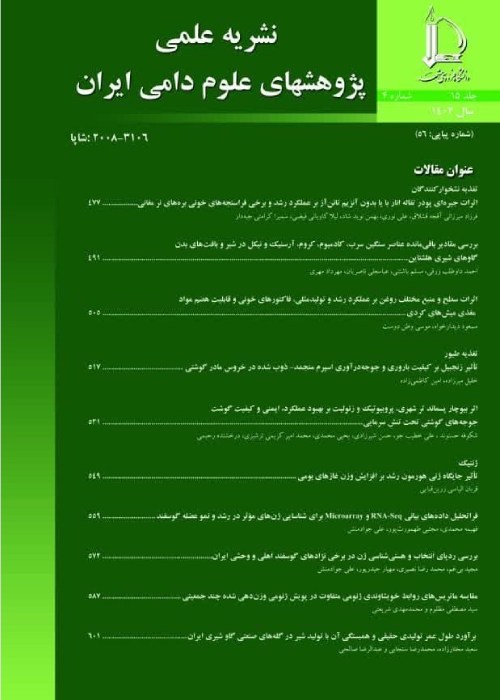Use of essential oils in broiler chickens: In-vitro antimicrobial activities and effects on growth performance, intestinal morphology and microflora
Antibiotics as growth promoters in poultry feed are posing serious health risks to human health. Because of their residual effects in poultry meat and eggs, as well as result pathogens develop resistance to antibiotics. Currently, poultry scientists are challenged to find out alternatives to antibiotic growth promoters with no side effects for poultry that could be more or as effective against harmful microorganisms in the gastrointestinal tract and to stimulate the growth by increasing the efficiency of feed utilization and to enhance the immunity. Regarding to this subject, supplementing the dietary herbs or plant extracts would stimulate the productive performance of poultry. In recent years, products containing essential oils derived from several spices and herbs could be used feed additives as growth promoters in animal nutrition. These phytogenic additives may have more than one mode of action, including improving feed intake and flavor, stimulating the secretion of digestive enzymes, increasing gastric and intestinal motility, endocrine stimulation, antimicrobial, anti-viral, anthelminthic and coccidiostat activities, immune stimulation, and anti-inflammatory and anti-oxidative activity and pigments. Many studies have also been conducted on the effects of dietary essential oils or combinations thereof on the performance of poultry but with varying and conflicting results. While one report demonstrated that essential oils improved animal performance, some researchers reported that these additives were not effective in this regard. Salmonella and Escherichia Coli bacteria have become the major cause of foodborne diseases which has raised a great safety concern to public health. In several geographic regions, a large proportion of foodborne diseases are confirmed by the hazardous salmonellosis caused by infectious Salmonella. The antibacterial effects of essential oils have received widespread attention and numerous reports exist in the literature. The essential oil of oregano has been shown to inhibit Escherichia coli, Staphylococcus aureus, Salmonella typhimurium, Staphylococcus aureus and Listeria monocytogenes. The aims of this study were to investigate the In-Vitro and In-Vivo effects of 5 dietary essential oils, marjoram, tanacetum balsamita, Artemisia annua, Fennel and Pinus, on minimal bactericide concentration (MBC) and minimal inhibitory concentration (MIC) of 5 bacteria strains including Escherichia coli (PTCC 1399), Klebsiella pneumonia (PTCC 1053), Salmonella typhimurium (PTCC1609), Staphylococcus aureus (PTCC 1764) and Streptococcus pyogenes (PTCC 1447) and performance and intestinal microflora of broiler chickens challenged with Salmonella typhimurium and Escherichia coli.
The disc diffusion method, the minimum inhibitory concentration (MIC), and the minimum bactericidal concentration (MBC) were applied for the determination of antimicrobial activities of essential oils. In vivo study, a total of three hundred eighty four 1-d-old broiler chickens were assigned to 8 dietary treatment groups: 1) Control= basal diet, 2) Control + Virginiamycin (200 mg/Kg), 3 and 4) Control+ Marjoram Hydro alcoholic essential oil (200 and 400 mg/Kg), 5 and 6) Control+ Fennel hydro alcoholic essential oil (200 and 400 mg/Kg) and 7 and 8) Control+ Tanacetum Balsamita Hydro alcoholic essential oil (200 and 400 mg/Kg). At the second week of life (8-14 d) the broilers of each replicate in all of the treatments divided to 3 part (4 broilers in each treatment) and one group had no challenge, and the 2 other groups were challenged with challenged with Escherichia coli and Salmonella typhimurium. Essential oils were provided by Giah-Essanse Company in Golestan Province. The diets were formulated to meet the requirements of broilers as established by the Ross 308 broilers feeding guide in starter (1-14 d). The birds were kept under conventional conditions for vaccination, temperature, ventilation, and lighting based on Ross 308 catalogue recommendations. Standard management practices of commercial broiler production were applied. The broiler diets were formulated based on standardized ileal digestible amino acids and other requirements were obtained from Ross catalogue recommendations. Broiler chicken performance (feed intake, body weight gain, feed conversion efficiency at the end of the first and second week of age), blood cell count and ileal morphology were measured. Finally population of Lactobacillus and Escherichia coli of ileum were detected.
The results showed that fennel, tanacetum and marjoram essential oils inhibited the growth of Escherichia coli and Salmonella typhimurium and the greatest MBC belonged to tanacetum essential oil as compared to virginiamycin. Inclusion of essential oils improved feed intake and body weight gain of broiler chickens changed with Escherichia coli and Salmonella typhimurium. Escherichia coli-challenged broiler chickens fed diet supplemented with essential oils had higher lymphocyte percentage and lower heterophil to lymphocyte ratio as compared to control group. Essential oils significantly increased Lactobacillus and decreased Escherichia coli count of healthy and Escherichia coli challenged broiler chickens compared to control group respectively.
In conclusion, supplementation of essential oil had MIC and MBC effects and improved growth performance of broiler chickens challenged with Escherichia coli and Salmonella typhimurium. It is suggested that these essential oils can be supplemented to broiler chickens diet as substitution of antibiotics.
- حق عضویت دریافتی صرف حمایت از نشریات عضو و نگهداری، تکمیل و توسعه مگیران میشود.
- پرداخت حق اشتراک و دانلود مقالات اجازه بازنشر آن در سایر رسانههای چاپی و دیجیتال را به کاربر نمیدهد.



